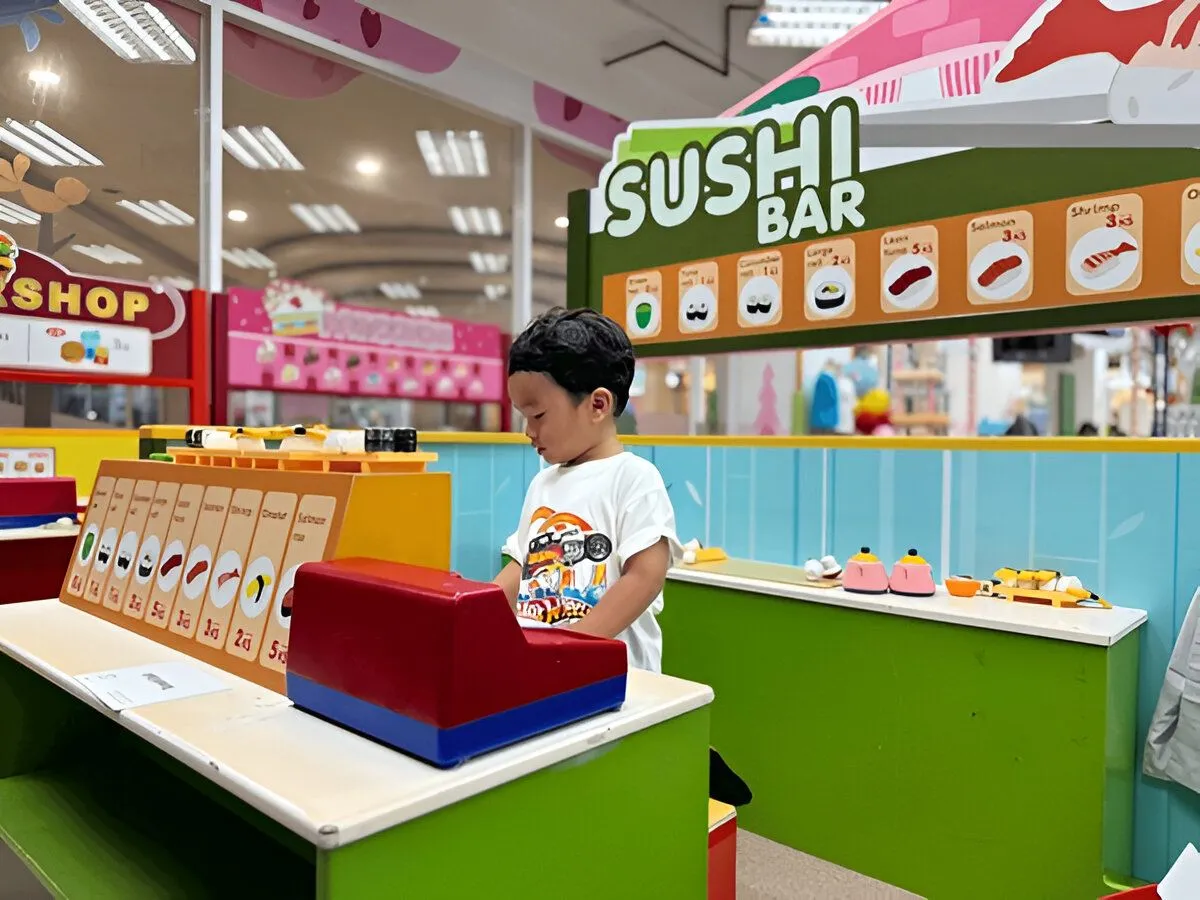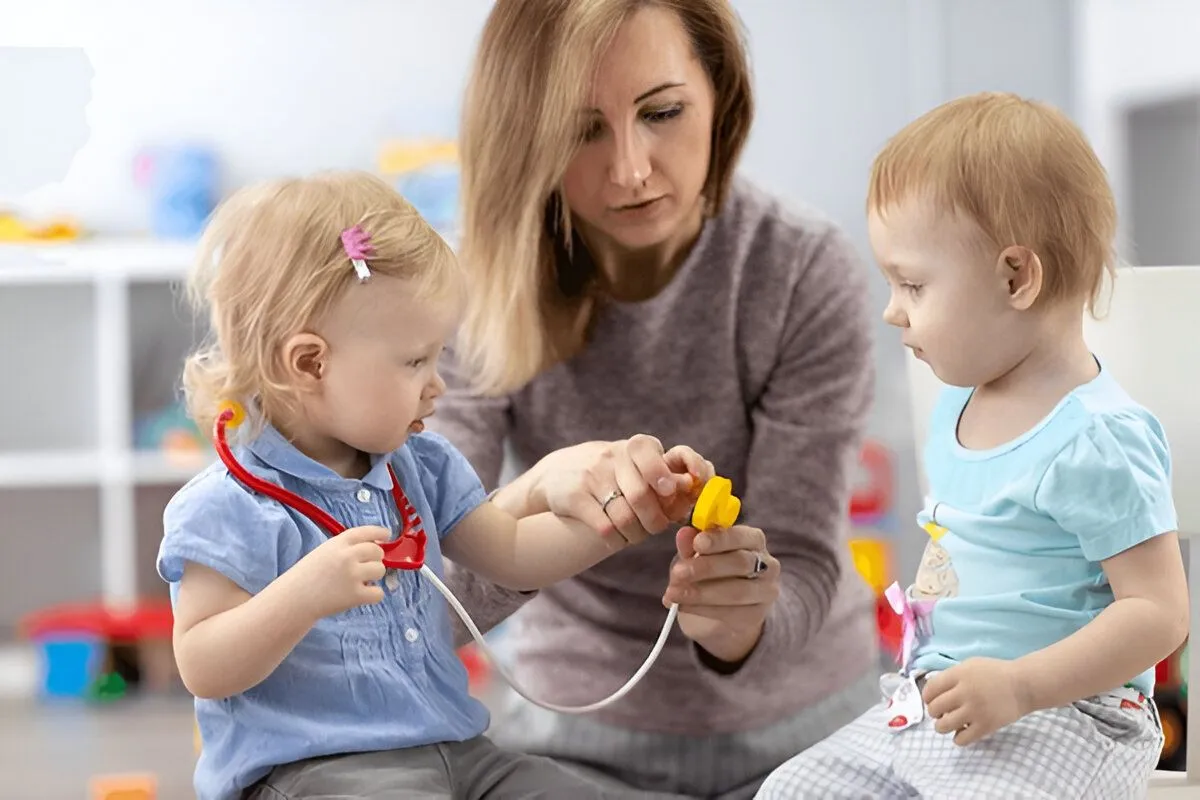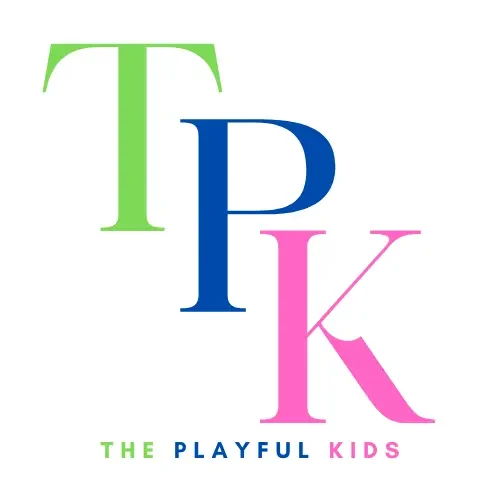In childhood, imagination has no limits. Role-play boosts emotional growth. A child acting as a doctor learns empathy. Becoming a superhero builds courage. Playing parent teaches understanding. Taking the teacher’s role improves communication. These games shape vital emotional skills. This article looks at role-play’s impact. It explains how children learn feelings, shows which skills they gain, and offers tips for parents and teachers.
Understanding Role-Play: More Than Just Pretending
Role-play is also called dramatic or pretend play. Children take on new identities. They act out different scenarios. It’s a complex cognitive process. It emerges naturally in development, peaks between ages two and six, and remains important throughout childhood.
Role-play works in the “zone of proximal development.” That idea comes from Lev Vygotsky. It’s the gap between what a child can do alone and with help. Pretend play bridges that gap. Children stretch beyond their current limits. They try on new emotions, behaviors, and situations.
Dr. Laura Berk explains the power of pretend play. She’s a leading child development researcher. She says children act beyond their real abilities. A child afraid of doctors can pretend to be one. This helps them face and master their fears. They do it in a safe, controlled space.
This cognitive stretching is precisely what makes role-play such a powerful catalyst for emotional development. Let’s explore exactly how this works.
The Neurological Impact of Role-Play
The benefits of role-play aren’t just theoretical—they’re neurological. When children engage in imaginative play, they activate multiple brain regions simultaneously, creating new neural pathways that support emotional intelligence.
The prefrontal cortex—responsible for executive functions like planning, decision-making, and impulse control—shows heightened activity during role-play. Simultaneously, the limbic system, our emotional center, engages as children experiment with different emotional states. This creates a powerful brain-building experience where cognitive and emotional development occur in tandem.
Neuroscientist Dr. Sarah-Jayne Blakemore observes: “Role-play creates a unique neurological environment where children can safely practice emotional regulation while simultaneously developing cognitive skills like planning and perspective-taking. This integration is critical for developing emotional intelligence.”
Seven Key Emotional Skills Developed Through Role-Play

1. Emotional Literacy and Recognition
Role-play creates a safe space for emotional exploration. Children discover and name different feelings through pretend characters. They learn to express joy, sadness, fear, and anger during play.
Emotional literacy builds the foundation for emotional intelligence. Children recognize subtle differences between emotions. They spot the gap between disappointment and sadness. They notice when irritation differs from anger.
Dr. Eileen Kennedy-Moore notes: “Children build an internal emotional dictionary through role-play. This helps them name their feelings in real situations.”
Practical Example: A child playing “restaurant” feels frustration when the pretend dish fails. They experience satisfaction creating a “perfect meal.” Pride follows when serving “customers.” One simple game teaches multiple emotions quickly.
2. Emotional Regulation and Coping Strategies
Role-play teaches emotional control. Kids learn to manage big feelings while playing. The pretend scenario continues only if emotions stay in check.
Research confirms this benefit. “Developmental Psychology” found clear evidence. Children who play imaginatively regulate emotions better. They experience strong feelings safely. No real-world fallout exists.
Dr. Shanker explains it simply: “Children practice being overwhelmed. Then they find calm again. This rehearsal helps with real emotional challenges.”
Example: The child-as-superhero feels fear facing villains. Anger follows a pretend defeat. They must regulate both to continue the story. They calm down to “save the day.” Each emotional cycle builds coping skills.
3. Empathy and Perspective-Taking
Empathy—the ability to understand and share the feelings of another—is a cornerstone of emotional intelligence and healthy relationships. Role-play provides children with regular opportunities to step into someone else’s shoes quite literally, fostering empathetic understanding.
A child becomes a parent soothing a baby. They play doctor healing wounds. They even act as villains with motives. Each role builds perspective-taking. They learn others have different minds. Psychologists call this “theory of mind.”
Research proves the impact. One study tracked children for years. Four-year-olds who role-played showed more empathy at age seven. The difference was significant.
Dr. Hoffman explains why: “Role-play creates felt experiences. Children live in another’s situation. This goes deeper than thinking about feelings.”
Example: A child plays teacher, imagines the confused student’s frustration, considers what might help their learning, and responds with patience. Empathy grows through this practice.
4. Emotional Resilience Through Safe Processing of Difficult Feelings
Role-play provides children with a psychological mechanism known as “emotional containment”—a safe boundary within which to experience and process difficult emotions or traumatic experiences. This containment aspect is why play therapy is so effective for children processing grief, trauma, or major life transitions.
Through play, children can revisit challenging emotional experiences but with a crucial difference—they have agency and control over the narrative. This sense of mastery helps transform feelings of helplessness into empowerment, building emotional resilience.
Child therapist Dr. Eliana Gil notes: “When children recreate challenging experiences through play, they’re metabolizing difficult emotions bit by bit, at a pace they can handle. The play frame provides psychological safety that allows for processing without retraumatization.”
Practical Example: A child who experienced anxiety during a hospital visit might repeatedly play “hospital” with stuffed animals, working through their feelings by sometimes being the doctor, sometimes the patient, and gradually mastering the emotional landscape of the experience.
5. Emotional Communication and Negotiation Skills
Role-play rarely happens in isolation—it’s often a social activity requiring communication and negotiation. As children collaborate in pretend scenarios, they must express their ideas, listen to others, compromise, and resolve conflicts about the direction of play.
These interactions provide rich opportunities to practice emotional communication. Children learn to read others’ emotional cues, express their own feelings constructively, and navigate disagreements—all within the motivating context of maintaining the play they’re enjoying.
Research from the University of Cambridge found that children who regularly engaged in sociodramatic play showed more sophisticated conflict resolution skills and emotional communication strategies than peers who engaged in less complex forms of play.
Education researcher Vivian Gussin Paley observed in her landmark work on children’s play: “The social negotiations during pretend play may look simple, but they represent complex emotional diplomacy as children balance their own desires with maintaining positive play relationships.”
Practical Example: Two children playing “space explorers” might need to negotiate who gets to be the captain today, how to respond when one player introduces an unexpected element like aliens, and how to resolve disagreements while maintaining the emotional safety of the play space.
6. Processing and Understanding Social Roles and Relationships
Through role-play, children explore and make meaning of the social world around them. By trying on different social roles—family members, community helpers, fantasy characters—they gain emotional insight into how relationships work and how people in different positions might feel.
This exploration helps children understand emotional expectations in various contexts. They learn that a teacher might need to project authority while feeling care for students, or that a parent might feel both love and frustration simultaneously. This nuanced emotional understanding helps children navigate their own relationships more skillfully.
Developmental psychologist Dr. Kathy Hirsh-Pasek explains: “When children play house or school or store, they’re not just imitating what they’ve seen—they’re theorizing about the emotional lives of these roles. This theory-building is sophisticated emotional work that prepares them for future social relationships.”
Practical Example: In playing “family,” a child might explore what it feels like to be the parent setting boundaries, the sibling negotiating for privileges, or the baby needing care. Each role provides different emotional insights about family dynamics.
7. Building Emotional Self-Concept and Identity
As children try on different roles and identities in play, they’re also developing their emotional self-concept—their understanding of who they are emotionally. Each role they adopt helps them explore different facets of their emotional selves in a low-risk environment.
Dr. Paul Harris, a researcher at Harvard Graduate School of Education, has found that children use pretend play to explore possible selves—trying out what it might feel like to be brave, nurturing, powerful, or creative. This exploration helps them identify emotional strengths and aspects of identity they might want to cultivate.
Psychologist Erik Erikson recognized this function of play in his stages of psychosocial development, noting that play allows children to experiment with different versions of themselves as they work to answer the question: “Who am I?”
Practical Example: A shy child might pretend to be a confident stage performer or brave explorer, temporarily experiencing emotional states that contrast with their typical way of being. This exploration can gradually influence their self-concept and comfort with a wider emotional range.
The Role of Adults in Supporting Emotional Development Through Role-Play

While role-play naturally supports emotional development, thoughtful adult involvement can maximize these benefits. Here’s how parents, teachers, and caregivers can enhance the emotional value of children’s pretend play:
Provide Rich Materials Without Overprescribing
Open-ended materials that can transform into multiple things (fabric pieces, blocks, cardboard boxes) support more creative and emotionally varied play than highly structured toys. These materials allow children to externalize their emotional world through physical objects.
Dr. Susan Linn, a psychologist specializing in creative play, advises: “The best materials for emotional development in play are those that can become anything the child needs them to be. A simple piece of fabric can be a superhero cape, a doctor’s coat, or a baby blanket—allowing children to move fluidly between different emotional scenarios.”
Create Time and Space for Extended Play
Emotional depth in role-play requires time. When children know they have uninterrupted time to develop their scenarios, they’re more likely to explore complex emotional narratives rather than just surface-level play.
Research shows that children who have at least 30 minutes of uninterrupted play time engage in significantly more complex emotional scenarios than those whose play is frequently interrupted. This extended time allows for the development, conflict, and resolution phases that mirror emotional processing.
Observe Before Joining
When adults join children’s play, they should first observe to understand the emotional landscape being created. What emotions are being explored? What roles have been established? This observation helps adults enter the play in ways that extend rather than redirect the emotional exploration.
Early childhood educator Elizabeth Jones recommends: “Watch and listen before entering children’s play. Ask yourself: What emotions are they working with right now? How can I enter in a way that validates and extends that emotional exploration rather than changing its direction?”
Use Thoughtful Questions and Commentary
Adults can enrich the emotional content of play with thoughtful questions and observations: “Your character seems worried about something. What’s on their mind?” or “I notice the baby in your game needs a lot of comfort. What might help them feel better?”
These prompts help children articulate the emotional dimensions of their play and potentially explore them more deeply.
Process Real-Life Emotions Through Play
When children are dealing with big emotions in real life—excitement about a new sibling, anxiety about starting school, grief over a loss—adults can intentionally provide role-play opportunities related to these experiences.
Child therapist Dr. Garry Landreth explains: “Play is the child’s symbolic language of self-expression. By creating opportunities for play around real-life emotional challenges, we give children a language to express what they may not have words for.”
Special Considerations for Different Ages
Toddlers and Young Preschoolers (Ages 2-3)
At this age, role-play begins as simple imitation of familiar activities and roles. Emotional play focuses primarily on everyday experiences like feeding a baby, cooking food, or driving a car.
Adults can support emotional development by:
- Providing simple props related to familiar experiences
- Modeling basic emotional language during play (“The baby is crying. She seems sad.”)
- Engaging in parallel play that demonstrates emotional responses
Older Preschoolers and Kindergarteners (Ages 4-6)
This is the golden age of dramatic play, with children engaging in complex scenarios and taking on varied roles. Emotional themes become more sophisticated, incorporating characters from media, community helpers, and fantasy roles.
Adults can support emotional development by:
- Encouraging group play that requires emotional negotiation
- Introducing more nuanced emotional vocabulary
- Helping children connect play scenarios to real-life emotional experiences
Elementary School Children (Ages 7-10)
While often overlooked, role-play remains important in this age group, though it may look different—taking the form of elaborate games with rules, dramatization with action figures, or digital role-playing games.
Adults can support emotional development by:
- Validating that role-play is still appropriate and valuable at this age
- Encouraging children to create characters with complex motivations and emotional lives
- Using role-play techniques to explore challenging social scenarios at school
When Role-Play Reveals Emotional Concerns
Sometimes, children’s role-play can reveal emotional challenges that may need additional support. Signs that might warrant attention include:
- Repetitive play that seems stuck on traumatic themes without resolution
- Role-play consistently dominated by intense fear, aggression, or sadness without modulation
- Sudden changes in play themes that reflect distress
- Inability to distinguish between play and reality
If these patterns emerge, consulting with a child psychologist or play therapist can provide guidance. Often, with appropriate support, role-play itself can become a vehicle for healing.
Enhancing Role-Play Opportunities in Today’s World

In our increasingly scheduled and screen-oriented world, intentional efforts to preserve role-play opportunities are essential for emotional development. Consider these approaches:
Balancing Technology with Imaginative Play
Digital play and traditional role-play can coexist, but balance is key. Some digital games include role-playing elements that support emotional development, while others may displace the unstructured imaginative play that’s most beneficial.
Media researcher Dr. Jordan Shapiro suggests: “Rather than viewing screens as the enemy of imaginative play, look for ways technology can extend role-play themes or inspire new scenarios. The key is ensuring digital experiences complement rather than replace embodied play experiences.”
Creating Community Play Opportunities
Neighborhood play groups, cooperative preschools, and community events can create spaces where children play together in mixed-age groups, expanding the emotional complexity of their play scenarios.
Sociologist Dr. Peter Gray notes: “Mixed-age play provides unique emotional benefits, as younger children are stretched by the complexity older children bring, while older children practice nurturing and leadership with younger playmates.”
Advocating for Play-Based Learning
Parents and educators can advocate for educational approaches that recognize the emotional development value of role-play. This means supporting curriculums that incorporate dramatic play centers, character exploration, and storytelling even as academic demands increase.
Early childhood expert Vivian Paley emphasized throughout her career: “The fantasy play that looks least academic may in fact be building the most crucial foundation for academic success—emotional regulation, creative thinking, and social connection.”
Conclusion: The Lifelong Impact of Role-Play
The emotional skills developed through childhood role-play don’t disappear when the dress-up clothes are outgrown. They evolve into the emotional intelligence that supports adult success and wellbeing.
A child who soothes a stuffed animal learns empathy, one who alternates between leading and following in games gains adaptability, and one who conquers fear through superhero play builds resilience for life’s challenges.
By understanding and supporting the powerful connection between role-play and emotional development, we give children more than just happy play memories—we help them build the emotional foundation that will serve them throughout their lives.
When we truly appreciate role-play as the serious emotional work of childhood, we can see that in those moments of pretending, children aren’t just playing at life—they’re rehearsing for it, with all its rich emotional complexity.
What role-play themes have you noticed in your child’s play? How have you seen their emotional skills develop through imaginative play? Share your experiences in the comments below!
